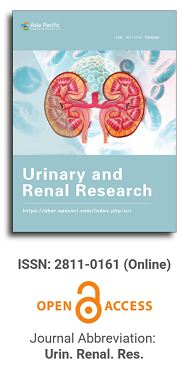
Asia Pacific Academy of Science Pte. Ltd. (APACSCI) specializes in international journal publishing. APACSCI adopts the open access publishing model and provides an important communication bridge for academic groups whose interest fields include engineering, technology, medicine, computer, mathematics, agriculture and forestry, and environment.
Community acquired urinary tract infection
Vol 2, Issue 2, 2021
Download PDF
Abstract
Urinary tract infection (UTI) is one of the most common infectious diseases, which causes huge economic losses all over the world every year. The term ITU includes the pathology of different anatomical regions: urethritis, cystitis, pyelonephritis and prostatitis; Cystitis is the most common, usually manifested as dysuria, frequent urination and urgency. ITU includes a wide range of clinical manifestations, from simple colonization to septic shock. Intestinal bacteria are the main pathogens causing UTI, among which Escherichia coli is the main pathogen. It is the second largest cause of bacterial infection in the community after respiratory tract infection; The incidence increases with age and gender. For other healthy, sexually active, non pregnant female patients, these forms can be divided into non complex forms; Complications occur in patients with certain risk factors, such as structural or functional urinary tract abnormalities, basic diseases or special populations, such as pregnant women and children. The diagnosis is mainly based on clinic and urine examination is carried out as needed. In most cases, treatment is empirical and outpatient antibiotic treatment.
Keywords
References
- Urinary tract infection [Internet] 2019. Location: https://doi.org/10.1016/j.mpmed.2019.06.008
- Urinary tract infection [Internet] 2018. Location: https://doi.org/10.1016/S1636-5410 (18)89311-4
- Recurrent urinary tract infection: from etiology to prevention strategy [Internet] Dial. 2020. Location: https://dialnet.unirioja.es/servlet/articulo?Codigo= seven million five hundred and twenty-seven thousand and ninety-seven
- Pathophysiology of urinary tract infection [Internet] 2020. Location: https://doi.org/10.1016/j.mpsur.2020.01.011
- Evaluation and management of urinary tract infection in emergency department [Internet]. 2019. Website: https://doi.org/10.1016/j.emc.2019.07.007
- Diagnosis and treatment of cross age urinary tract infection [Internet]. 2018. Location: https://doi.org/10.1016/j.ajog.2017.12.231
- Wang Jianhua, Wang Jianhua, Wang Jianhua. Urinary tract infection [journal paper] - Chinese Journal of urology. Dial. 2018. Location: https://dialnet.unirioja.es/servlet/articulo?Codigo= six million three hundred and forty-nine thousand nine hundred and eighteen
- Urinary tract infection: Pathogenesis and prospect [Internet] 2016. Location: https://doi.org/10.1016/j.molmed.2016.09.003
- Female urinary tract infection [Internet] FMC Yeah. 2019. Location: https://www.fmc.es/es-infeccion- Urinary tract - women - Project - s1134207219301409 - purchase
- Chen Jianhua, Chen Jianhua, Chen Jianhua. Empirical treatment of urinary tract infection [journal paper] - Chinese Journal of urology. 2018. Location: https://doi.org/10.1016/j.med.2018.03.007
- Wang Jianmin, Wang Jianmin, et al. Urinary tract infection [journal paper] - Chinese Journal of urology 2017. Location: https://doi.org/10.7326/AITC201710030
- Urinary tract infection [Internet] 2019. Location: https://doi.org/10.1016/j.pcl.2018.08.002
- PI ñ eiro P é r EZ R, cilleruelo Ortega m, Ares Alvarez J, baquero artigao F, Silva Rico J, Velasco Z ú niga R, et al. Advice on diagnosis and treatment of urinary tract infection [Internet] 2019. Location: https://doi.org/10.1016/j.anpedi.2019.02.009
- Mattuizzi a, madar h, froeliger a, brun s, sarrau m, bardy C et al. Urinary tract infection and pregnancy [Internet]. 2018. Location: https://doi.org/10.1016/S1283-081X (18)41444-0
- Male urinary tract infection [Internet] Dial. 2019. Location: https://dialnet.unirioja.es/servlet/articulo?Codigo= seven million one hundred and thirty-one thousand five hundred and nineteen
Supporting Agencies
Copyright (c) 2021 David Zarnowski Varela, Andrea Salazar Santizo, Andrés Zarnowski Gutiérrez

This work is licensed under a Creative Commons Attribution-NonCommercial 4.0 International License.

This site is licensed under a Creative Commons Attribution 4.0 International License (CC BY 4.0).
.png)
Prof. Wei-Yen Hsu
National Chung Cheng University, Taiwan

